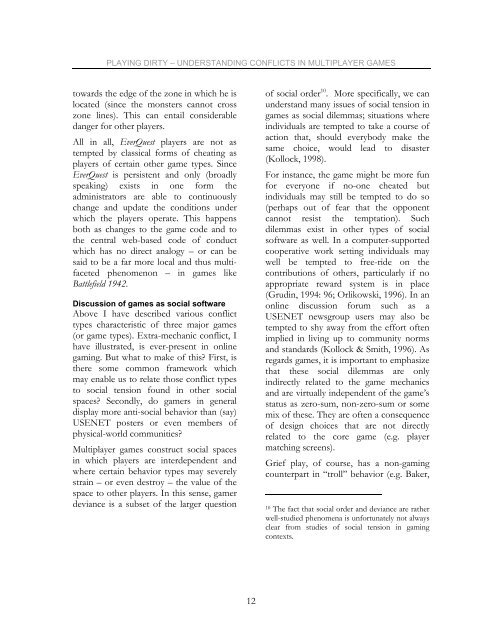Playing Dirty â Understanding Conflicts In Multiplayer Games
Playing Dirty â Understanding Conflicts In Multiplayer Games
Playing Dirty â Understanding Conflicts In Multiplayer Games
Create successful ePaper yourself
Turn your PDF publications into a flip-book with our unique Google optimized e-Paper software.
PLAYING DIRTY – UNDERSTANDING CONFLICTS IN MULTIPLAYER GAMES<br />
towards the edge of the zone in which he is<br />
located (since the monsters cannot cross<br />
zone lines). This can entail considerable<br />
danger for other players.<br />
All in all, EverQuest players are not as<br />
tempted by classical forms of cheating as<br />
players of certain other game types. Since<br />
EverQuest is persistent and only (broadly<br />
speaking) exists in one form the<br />
administrators are able to continuously<br />
change and update the conditions under<br />
which the players operate. This happens<br />
both as changes to the game code and to<br />
the central web-based code of conduct<br />
which has no direct analogy – or can be<br />
said to be a far more local and thus multifaceted<br />
phenomenon – in games like<br />
Battlefield 1942.<br />
Discussion of games as social software<br />
Above I have described various conflict<br />
types characteristic of three major games<br />
(or game types). Extra-mechanic conflict, I<br />
have illustrated, is ever-present in online<br />
gaming. But what to make of this? First, is<br />
there some common framework which<br />
may enable us to relate those conflict types<br />
to social tension found in other social<br />
spaces? Secondly, do gamers in general<br />
display more anti-social behavior than (say)<br />
USENET posters or even members of<br />
physical-world communities?<br />
<strong>Multiplayer</strong> games construct social spaces<br />
in which players are interdependent and<br />
where certain behavior types may severely<br />
strain – or even destroy – the value of the<br />
space to other players. <strong>In</strong> this sense, gamer<br />
deviance is a subset of the larger question<br />
of social order 10 . More specifically, we can<br />
understand many issues of social tension in<br />
games as social dilemmas; situations where<br />
individuals are tempted to take a course of<br />
action that, should everybody make the<br />
same choice, would lead to disaster<br />
(Kollock, 1998).<br />
For instance, the game might be more fun<br />
for everyone if no-one cheated but<br />
individuals may still be tempted to do so<br />
(perhaps out of fear that the opponent<br />
cannot resist the temptation). Such<br />
dilemmas exist in other types of social<br />
software as well. <strong>In</strong> a computer-supported<br />
cooperative work setting individuals may<br />
well be tempted to free-ride on the<br />
contributions of others, particularly if no<br />
appropriate reward system is in place<br />
(Grudin, 1994: 96; Orlikowski, 1996). <strong>In</strong> an<br />
online discussion forum such as a<br />
USENET newsgroup users may also be<br />
tempted to shy away from the effort often<br />
implied in living up to community norms<br />
and standards (Kollock & Smith, 1996). As<br />
regards games, it is important to emphasize<br />
that these social dilemmas are only<br />
indirectly related to the game mechanics<br />
and are virtually independent of the game’s<br />
status as zero-sum, non-zero-sum or some<br />
mix of these. They are often a consequence<br />
of design choices that are not directly<br />
related to the core game (e.g. player<br />
matching screens).<br />
Grief play, of course, has a non-gaming<br />
counterpart in “troll” behavior (e.g. Baker,<br />
10 The fact that social order and deviance are rather<br />
well-studied phenomena is unfortunately not always<br />
clear from studies of social tension in gaming<br />
contexts.<br />
12



